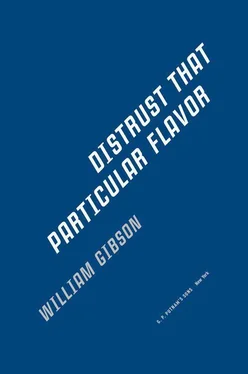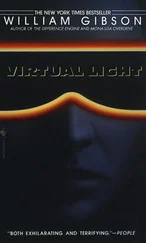THE PARADOXICAL SOLITUDE and omnipotence of the otaku , the new century’s ultimate enthusiast: the glory and terror inherent in the absolute narrowing of personal bandwidth.
HIKARU DORODANGO — shiny balls of mud.
Professor Fumio Kayo of the Kyoto University of Education first encountered these enigmatic, glistening spheres in a nursery school in Kyoto in 1999.
The dorodango , balls of mud compressed with the hands and painstakingly formed into perfect spheres, became the object of considerable media attention.
THE SILENT young men who must sometimes appear, blinking, in the unaccustomed glare of a Tokyo 7-Eleven at three in the morning, stocking up on white foam bowls of instant ramen, in their unlaundered, curiously outmoded clothing, are themselves engaged in the creation of dorodango , their chosen material: existence itself.

ABOUT THREE INCHES in diameter, the surface of a completed dorodango glistens with an illusion of depth not unlike that seen in traditional Japanese pottery glazes. A dorodango becomes its maker’s greatest treasure.
Kayo has invented a scale for recording a dorodango ’s luster, with the shiniest rating a 5. It took him two hundred attempts and analysis with an electron microscope to duplicate the children’s results and produce an adequately lustrous dorodango .
The genesis of the making of hikaru dorodango remains an absolute mystery.
THE FLOORS of Tokyu Hands are haunted for me now with the mysterious, all-encompassing presence of the hikaru dorodango , an artifact of such utter simplicity and perfection that it seems it must be either the first object or the last, something that either instigated the Big Bang or awaits the final precipitous descent into universal silence. At the very end of things waits the hikaru dorodango , a perfect three-inch sphere of mud. At its heart: the unthinkable.
The secret of Tokyu Hands is that everything on offer there inclines, ultimately, to the status, if not the perfection, of hikaru dorodango . The brogues, shined lovingly enough, for long enough, with those meticulously imported shoe-care products, must ultimately become a universe unto themselves, a conceptual sphere of lustrous and infinite depth.
Just as a life, lived silently enough, in sufficient solitude, becomes a different sort of sphere, no less perfect.

Writing for the Tate’s own magazine somehow provided an unusual sense of security, almost of privacy. With the result that I wish this were a novel, somehow.


I FIRST READ Jorge Luis Borges’s Labyrinths in an armchair upholstered with a smooth lettuce-green brocade, patterned with leaves that were themselves not unlike lettuce, though they were also rather like clouds, or perhaps rabbits. I regarded that chair as an environment in and of itself, having known it since earlier childhood. It was the only relatively safe place in a room I regarded as ominously formal and adult, a room dominated by large pieces of dark furniture belonging to my mother’s family. One of these was an unnaturally tall desk, topped with a bookcase closed with two long and solid doors, reputed, though dimly, to have once belonged to the Revolutionary hero Francis Marion. Its lower drawers smelled terrifyingly and chemically of Time, and within them, furled, lay elaborately printed scrolls listing the county’s dead in the Great War.
I now know that I believed, without quite wanting to admit it to myself, that that desk was haunted.
I initially discovered Borges in one of the more liberal-minded anthologies of science fiction, which had included his story “The Circular Ruins.” That sufficiently intrigued me that I sought out Labyrinths , which I imagine would have been fairly difficult for me to find, though I no longer recall those difficulties.
I do, however, remember the sensation, both complex and eerily simple, induced by my first reading of “Tlön, Uqbar, Orbis Tertius,” while seated in that green chair.
Had the concept of software been available to me, I imagine I would have felt as though I were installing something that exponentially increased what one day would be called bandwidth, though bandwidth of what, exactly, I remain unable to say. This sublime and cosmically comic fable of utterly pure information (i.e., the utterly fictive) gradually and relentlessly infiltrating and ultimately consuming the quotidian, opened something within me which has never yet closed.
Or without me, possibly, I hungrily and delightedly saw, as Borges’s hallmark corridors of mirrors opened out around me in every direction. Decades later, now, I understand the word “meme,” to the extent that I understand it at all, in terms of Tlön’s viral message, its initial vector a few mysteriously extra pages in an otherwise seemingly ordinary volume of a less than stellar encyclopedia.
Works we all our lives recall reading for the first time are among the truest milestones, but Labyrinths was a profoundly singular one, for me, and I believe I knew that, then, in my early adolescence. It was demonstrated to me, that afternoon. Proven. For, by the time I had finished with “Tlön” (though one never finishes with “Tlön,” nor indeed with any story by Borges) and had traversed “The Garden of Forking Paths” and wondered, literally bug-eyed, at “Pierre Menard, Author of the Quixote,” I discovered that I had ceased to be afraid of any influence that might dwell within Francis Marion’s towering desk.
Borges, this elegant and mysterious voice, whom I had instantly accepted as the most welcome of uncles, this inhabitant of a clearly mythical place called Buenos Aires, had somehow dissolved a great deal of childhood superstition. He had stretched basic paradigms as effortlessly, it seemed, as another gentleman might tip his hat and wink, and I had felt a certain crudeness, a certain foolishness, fall away.
I sat, changed, in the green chair, and regarded a different world, one whose underpinnings had been revealed to be at once infinitely more mysterious and far more interesting than I could previously have imagined.
When I left that room, I took Borges with me, and my life has been better for it, much better.
If you haven’t yet made the gentleman’s acquaintance, I can only urge you to do so. In all humility, I can serve no other function, here at the front of this now-venerable collection of his incomparable fictions, than to act, mercifully briefly, as a sort of butler. I am not a Borges scholar, nor indeed any sort of scholar, but I am honored (though indeed embarrassed, believing myself unworthy) to invite you in.
Please.
Many afternoons, decades, after my own introduction to Borges, I found myself in Barcelona, in late December, attending a festival celebrating his life and work. The events of the festival were staged in some vast repurposed fortress or castle, a structure I imagined had lain dusty and silent during the seeming centuries of Francisco Franco’s ghastly rule, but which now, through the briskly confident resurgence of Catalan culture and vast amounts of European Union capital, hummed and gleamed like a vacuum tube within a thirteenth-century reliquary.
Читать дальше













